|
|
|
Sort Order |
|
|
|
Items / Page
|
|
|
|
|
|
|
| Srl | Item |
| 1 |
ID:
183700
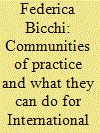

|
|
|
|
|
| Summary/Abstract |
This article argues that communities of practice (CoPs) provide IR with a unique way to understand how a small group of committed people can make a difference to international politics. The point is addressed in three steps. First, the article advances our understanding of how CoPs work. While at its core a CoP is a group of people brought together by a practice they enjoy, a CoP also shares a sense of timing, placing, and humour. These aspects help the group anchor, refine, and innovate their practice in the face of challenges and uncertainty. Second, the article contrasts the analysis of CoPs with other IR approaches, especially institutional analysis, network analysis, and epistemic communities, to show how CoPs supplement them. Third, the article illustrates the argument with the example of the EU foreign policy towards the Israeli-Palestinian conflict. It concludes by suggesting that a CoP's perspective not only helps IR better understand informal politics, but also opens up conversations across disciplines.
|
|
|
|
|
|
|
|
|
|
|
|
|
|
|
|
| 2 |
ID:
183703
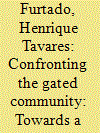

|
|
|
|
|
| Summary/Abstract |
This article investigates the works of Dussel, Maldonado-Torres, and Mbembe as representatives of a tendency in the field of decolonial thought to assume the templates of warfare and the camp as the archetypal registers of violence in the contemporary world. Identifying this focus as the remnant of a Eurocentric vocabulary (the paradigm of war), the article proposes a shift from the language of warfare predominant in the field to a language of welfare. The article turns to the gated community (GC), instead of the camp, and the imperatives of (re)creation, instead of the logics of elimination, as new templates with which to make sense of modern/colonial violence. Moving beyond militaristic imagery, the analysis shows a form of violence that emerges as a response to the endless search for a life of convenience inside the walls of the GC. To this end, the article advances the concept of the dialect of disarrangement, the enforced but uneasy encounter between two subjectivities that inhabit the GC: the patrons (the homeowners who consume the easy life) and servants (the racialised service staff). In the GC, violence emerges in attempts to respond to this (in)convenient encounter via misrepresentations of both patrons and servants as out of their place.
|
|
|
|
|
|
|
|
|
|
|
|
|
|
|
|
| 3 |
ID:
183708
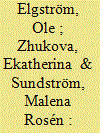

|
|
|
|
|
| Summary/Abstract |
Drawing on the IR theories of norm translation and strategic narratives, this article focuses on how states translate international norms to their own advantage by producing strategic narratives to advance their soft power ambitions abroad. Using the example of feminist foreign policy (FFP), the article compares Sweden, Canada, France, and Mexico in their attempts to translate international feminist norms into their countries’ strategic narratives. This comparison is based on three strategic narrative types (issue, national, and international system narratives) and two types of feminism (liberal, intersectional). Issue narratives reveal that Sweden and Mexico give more priority to social policies, while France and Canada emphasise the role of the market in addressing gender inequality. International system narratives demonstrate that Sweden and Mexico perceive global challenges as drivers of gender inequality, while France and Canada see gender inequality as a cause of global problems. National narratives show that Sweden and Mexico refer to other FFP countries to ‘back up’ their feminist initiatives, while France and Canada do not relate to other states. Finally, while liberal feminism dominates all four FFPs, each state either prioritises particular aspects of it (legal, market, security, rights-based) or incorporates elements from intersectional feminism.
|
|
|
|
|
|
|
|
|
|
|
|
|
|
|
|
| 4 |
ID:
183702
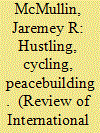

|
|
|
|
|
| Summary/Abstract |
Ex-combatant youth originated the commercial motorcycling sector in Liberia and have played a dominant role in its development. This article collates key insights narrated by one of Liberia's young ex-combatants-turned-commercial motorcyclists, Edwin Nyankoon, to build narrative accounts of peacebuilding around conceptualisation of youth livelihood, identity, and politics after war. The article contributes to diverse literatures on youth agency by emphasising the need for narrative and subject-led methodologies that anchor research questions and data analysis to research participants’ own language and narrated experiences of post war. It applies insights about everyday peace to interpret hustling as bottom-up peacebuilding, in opposition to dominant top-down peacebuilding accounts of ex-combatants. These latter accounts largely fail to see youth actors as peacebuilding agents, constructing them instead as troublemakers and interpreting their livelihood activities in terms of criminality and threat. Additionally, it argues that hustling also constitutes a peacebuilding style. More than a coping strategy or an indicator of peace, hustling-as-peacebuilding-style is performative: relational, embodied, contradictory, and recognisable to its adherents as peace-promoting even if (and arguably because) outsiders construct it as peace-negating. This analysis problematises agency, social relations, gendered identity, and collective security as they relate to ex-combatant and conflict-affected youth during peace processes.
|
|
|
|
|
|
|
|
|
|
|
|
|
|
|
|
| 5 |
ID:
183701


|
|
|
|
|
| Summary/Abstract |
Conflict across African states has often been linked to ethnic-based biases in government, and exclusive policies. However, the domestic politics of developing states, and the elites who contest for power therein, have often been overlooked when explaining the patterns and risk of disorder and violence. We consider how African leaders practice politics in whom to represent, and at what level. These choices have consequences as how regimes accommodate political elites creates different competitive conditions which, in turn, create incentives and opportunities for political violence. Using a dataset on cabinet appointments over twenty years, we find that high levels of elite political inclusion and mal-apportionment in positions is consistently associated with increases in non-state violence. Power distribution levels among those groups included in senior positions account for more political violence than that which stems from exclusive politics.
|
|
|
|
|
|
|
|
|
|
|
|
|
|
|
|
| 6 |
ID:
183699
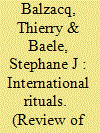

|
|
|
|
|
| Summary/Abstract |
The performance of ritual and the ritualisation of performance are the two main theoretical repertoires of ritual study in international politics and beyond. However, they also escalate tensions between those who insist on ritual's ability to operate by virtue of participants’ presence and those who believe that global networks of media call for a representational turn, which must tie participants and audiences across borders. Should we fail to understand how these distinct theoretical repertoires interact, it would be difficult to study international ritual, identify its functions, and trace its effects. Anchored in the sociology of ‘social occasions’, this article weaves ritual's patterns, properties, and resources into a coherent analytical framework. The framework enables us to better to grasp how actors move between/within different worlds (ritual and performance) and to what effects. The comparative study of two post-terrorism ritual occasions (the 2011 Rose March in Oslo and the 2015 Republican Marches in France) illustrates the usefulness of this theoretical proposition and its related framework.
|
|
|
|
|
|
|
|
|
|
|
|
|
|
|
|
| 7 |
ID:
183707


|
|
|
|
|
| Summary/Abstract |
A growing body of scholarship connects the participation of women and the inclusion of gender provisions to the sustainability of peace settlements. But how do women's groups navigate gender power structures and gendered forms of violence within complex and fragile political bargaining processes aimed at ending large-scale conflict? The 2016 Colombian peace agreement, internationally applauded for its inclusion of strong gender provisions and women's participation as negotiators and peace advocates, is a significant case for examining these questions. Drawing on original case material, including interviews of key actors on different sides of the conflict – this article analyses the political bargaining dynamics within and among women's movements, the Santos government and the Revolutionary Armed Forces of Colombia (Fuerzas Armadas Revolucionarias de Colombia, FARC). We argue that the inclusion of women was pivotal in transforming the elite bargaining process and power structures of Colombian society enabling a gender-based approach to the substantive peace agenda addressing transitional gender justice for sexual violence survivors and gender-equal redistribution through land and rural reform programmes. The study suggests that deeply situated political bargaining analysis is essential to navigating gender in elite bargains rather than a one-size-fits-all approach to inclusive peace.
|
|
|
|
|
|
|
|
|
|
|
|
|
|
|
|
| 8 |
ID:
183706


|
|
|
|
|
| Summary/Abstract |
This article aims to specifically contribute to debates concerning dissent within the scholarship of International Relations (IR), through elaborating the constructive qualities of resistance. Composite and fruitful stories concerning resistance against power have flourished in studies of the ‘global’. Still, there has been a trend in IR to embrace resistance as a sense of opposition and it has been primarily described in terms of, ‘“counter”, “contradict”, “social change”, “reject”, “challenge”, ‘opposition”, “subversive”, and “damage and/or disrupt”’.1 This article adds to the literature on resistance's productive dimensions by drawing upon the case of the #MeToo campaign in Japan. The #MeToo movement in Japan should not only be viewed as a ‘non-cooperative’ form of resistance – that is, resistance that breaks norms, rules, laws, regulations and order, typically in public and in confrontative ways; rather, the #MeToo movement should be regarded as a ‘constructive’ form of resistance, which produced new resistance figures, movements, narratives as well as established new expressions of resistance. It may be perceived as a contagious form of resistance, which operated through reiterations, doublings, and re-experiences. The campaign provides a significant example of how discourses move transnationally through the force of repetition.
|
|
|
|
|
|
|
|
|
|
|
|
|
|
|
|
| 9 |
ID:
183705
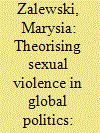

|
|
|
|
|
| Summary/Abstract |
A key curiosity animating this article concerns how sexual violence is theorised. The work of feminist scholars has been crucial in unearthing ways in which women's traditionally demeaned bodies regularly materialised as ‘easy targets’ for such violence. The gift of the concept of gender has played a significant role in facilitating the production of this corpus of knowledge. Less noticed in the literature, in policy and legislation has been sexual violence against men – an egregious omission. Yet it seems that redeploying the concept of gender to make sense of sexual violence against men and elevate this violence into the realms of theoretical and legislative attention is not straightforward. Identifying feminist work as in part responsible for the rendering of sexual violence against men as too ‘unseen’ in theory provoked my attention, though it's not that I place feminist theory as ‘innocent’ or infallible – far from it. In this article I unpack some of the complexities around theorising sexual politics in Global Politics turning towards the aesthetics of feminist thinking to help reconsider the way connections take shape between gender, sex and violence. Underpinning this discussion are questions about feminist intentions to transform patriarchal and colonial structures and institutions.
|
|
|
|
|
|
|
|
|
|
|
|
|
|
|
|
| 10 |
ID:
183704
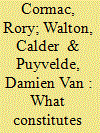

|
|
|
|
|
| Summary/Abstract |
Covert action has long been a controversial tool of international relations. However, there is remarkably little public understanding about whether it works and, more fundamentally, about what constitutes success in this shadowy arena of state activity. This article distills competing criteria of success and examines how covert actions become perceived as successes. We develop a conceptual model of covert action success as a social construct and illustrate it through the case of ‘the golden age of CIA operations’. The socially constructed nature of success has important implications not just for evaluating covert actions but also for using, and defending against, them.
|
|
|
|
|
|
|
|
|
|
|
|
|
|
|
|
|
|
|
|
|